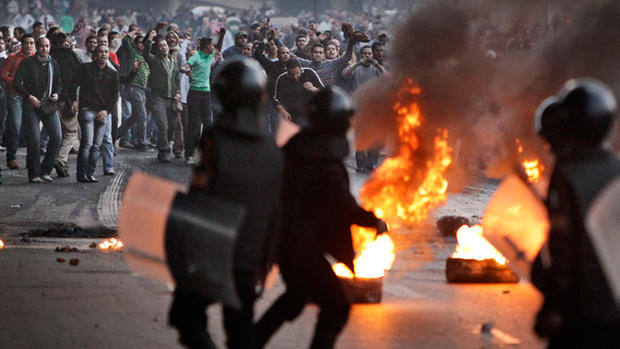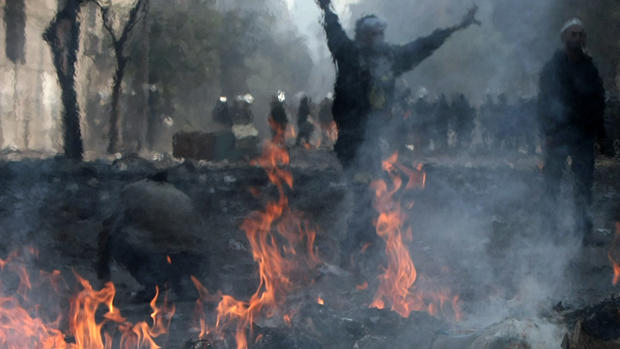The Arab Spring turns one year old
More than a protest, it was a revolution that swept across the Arab world, powered by the pent-up anger of millions who were suddenly no longer afraid.
A year of protests began on December 17, 2010, when Mohammed Bouazizi, a 26-year-old Tunisian vendor, set himself on fire in a protest against the government. Anger about Bouazizi's desperate act led to massive public demonstrations against Tunisia's longtime dictator.
"It's been the most important period in the history of the Arab peoples of the 20th century," Middle East expert Dr. Maha Azzam told CBS News. "It has demonstrated their ability to get rid of brutal dictatorships through civil uprisings."
Those civil uprisings quickly became a tsunami of citizens roaring for freedom - first in Tunisia, and then next door in the region's most populous country, Egypt, where the crowds declared Cairo's Tahrir Square to be a "Mubarak-free zone."
How a slap sparked Tunisia's revolution
Time's Person of the Year: "The Protester"
The strongmen - like Egypt's Hosni Mubarak - fought back with threats and thugs.
But video of the abuse went viral - thanks to computer-savvy young activists, fueling the fire.
Those camel riders sent galloping in to intimidate protestors in Tahrir Square were the desperate gambit of a faltering regime.
So was the decision in late January to fly fighter jets over the crowd - F-16s supplied to the Egyptian military by the United States.
One by one, the dictators fell. Mubarak ended up sick and behind bars. Zine Ben Ali of Tunisia was forced to flee his country.
And after 42 years of iron rule, Muammar Qaddafi of Libya was caught by armed rebels, and.his corpse put on public display.
In the oil-rich monarchies of the Gulf - especially Bahrain - the army fought and shot protesters, which (so far anyway) has saved the jobs of the royal heads of state.....but even they've had to make concessions.
"Again, it is a matter of time," Dr. Azzam said. "The opposition is ruthlessly suppressed in Bahrain and elsewhere in the Gulf region, but I think the voices of dissent will increase and it's going to be very difficult to maintain the political order."
In November - after a week of extraordinary violence - there was speculation that Egyptians would be too afraid to turn up and vote. Clearly not!
In Egypt and Tunisia this fall, elections have gone smoothly.
The big winners? Religious parties, including the Muslim Brotherhood.
It's payoff for years of underground grassroots organizing, said Shadi Hamid of the Brookings Institute.
"This is the Muslim Brotherhood's coming out party," said Hamid. "This is the moment they've been waiting for, and all the evidence is that they are going to dominate the results. So for them there's a kind of confidence and calmness about what's going on."
Confidence and calm not shared by Western governments - as they try to calculate the fallout from this seismic shift.
It's far too early to tell but some of the Muslim politicians elected to office are fundamentalists. The majority, though, are moderate and say they're committed to democracy.
"I think political Islam is evolving, and it's also multi-faceted," said Dr. Azzam. "We can't talk of one monolithic Islamist view. So yes, what we are seeing emerge now is a political Islam that is very much part and parcel of the democratization process."
The revolution that began in 2011 isn't over. These days, it's shaky cell phone video from Syria that shows yet another Arab dictatorship trying to put down a popular uprising.
The U.N. says 5,000 civilians have been killed so far as President Bashar al-Assad - one of the last strongmen in the region - clings to power through violence.
You have to wonder if he's been watching the news.
But the Arab Spring is far from over, and the big worry around the world is that what looks at the moment like a push for democracy could evolve into pockets of war.
The Arab Spring has also had a very significant impact on the United States' relations in the region. The State Department is having now to build new relationships with a whole new generation of power brokers. One thing we can say for sure, this seismic shift is going to put pressure on and complicate U.S. support for Israel.


